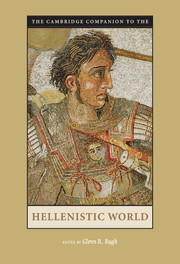Book contents
- Frontmatter
- Introduction
- 1 Alexander the Great and the Creation of the Hellenistic Age
- 2 The Hellenistic Kingdoms
- 3 The Polis and Federalism
- 4 Hellenistic Economies
- 5 The Hellenistic Family
- 6 History and Rhetoric
- 7 Material Culture
- 8 Hellenistic Art: Two Dozen Innovations
- 9 Language and Literature
- 10 Greek Religion: Continuity and Change in the Hellenistic Period
- 11 Philosophy for Life
- 12 Science, Medicine, and Technology
- 13 Hellenistic Military Developments
- 14 Greeks and Non-Greeks
- 15 Recent Trends and New Directions
- Hellenistic Dynasties
- Works Cited
- Index
14 - Greeks and Non-Greeks
Published online by Cambridge University Press: 28 November 2007
- Frontmatter
- Introduction
- 1 Alexander the Great and the Creation of the Hellenistic Age
- 2 The Hellenistic Kingdoms
- 3 The Polis and Federalism
- 4 Hellenistic Economies
- 5 The Hellenistic Family
- 6 History and Rhetoric
- 7 Material Culture
- 8 Hellenistic Art: Two Dozen Innovations
- 9 Language and Literature
- 10 Greek Religion: Continuity and Change in the Hellenistic Period
- 11 Philosophy for Life
- 12 Science, Medicine, and Technology
- 13 Hellenistic Military Developments
- 14 Greeks and Non-Greeks
- 15 Recent Trends and New Directions
- Hellenistic Dynasties
- Works Cited
- Index
Summary
Whatever else Greeks were, they were not barbarians - at least not by their own lights. After all, they spoke Greek. Others spoke in unintelligible tongues, thus sounding to Greek ears as so much “bar-bar-bar” (Strabo, 14.2.28). The term “barbarian” served to demarcate the Hellenic world from the non-Hellenic. It provided a useful device to establish (or construct) the distinctiveness of Greek values and character. When the term first came into fashion remains obscure. Its usage was rare indeed prior to the fifth century b.c.e. when the invasion of Persia galvanized the Greeks to develop a sharper sense of their own collective identity. The initial connotation of “barbarian” may have been quite neutral and innocent, nothing more than “gobbledy-gook speaker.” But in the fifth and fourth centuries, it began to carry a lot of extra baggage. It might suggest cultural or intellectual inferiority, lack of refinement, various insensibilities, brutality, chicanery, and a tendency to embrace despotism rather than the rule of law.
It was certainly better to be a Greek than a barbarian. A famous saying, ascribed both to Thales and to Socrates, gave thanks to the gods for three things: “That I was born human not an animal, a man not a woman, and a Greek not a barbarian!” (Diog. Laert. 1.3). Whether either of those philosophers made such a statement we cannot know. But the ascription appears in a Hellenistic text, by the biographer Hermippos of Smyrna in the third century b.c.e. And it earned an echo in rabbinic writings - with, of course, a Jewish twist: a prayer of thanks to the Lord “who did not make me a slave, did not make me a woman, and did not make me a goy.”
- Type
- Chapter
- Information
- The Cambridge Companion to the Hellenistic World , pp. 295 - 314Publisher: Cambridge University PressPrint publication year: 2006
- 4
- Cited by

